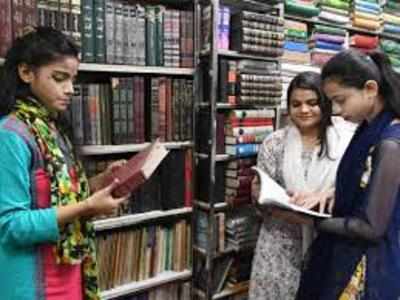- News
- Education News
- News
- SPPU: Corpus fund, 4-yr UG courses & deeper industry tie-ups for a strong presence
Trending
This story is from June 14, 2021
SPPU: Corpus fund, 4-yr UG courses & deeper industry tie-ups for a strong presence

Image used for representational purpose only
PUNE: Better research quality without duplicity, impetus to industrial and social problems, interdisciplinary approach in undergraduate courses, re-imagining courses with help from industry experts in designing curricula are among several suggestions from academicians and industry experts for Savitribai Phule Pune University’s (SPPU) post-pandemic plan for the next 10 years.
A university corpus fund, appointing experienced faculty with help from industry, research targets for the faculty and automation of administrative chores are among the broader ideas they shared.
Former vice-chancellor of Pune university WN Gade said in most cases, particularly in college research centres, research is repetitive and unoriginal.
“It is substandard for leading journals. During evaluation, guides send the theses to their friends, making the evaluation flawed. For better research, we need a more competitive, qualitative and transparent process,” he said.
“SPPU should revise all syllabi to bring an interdisciplinary approach. Every student must be taught maths, statistics, physics, chemistry, biology, computer science, sociology, psychology, economics as compulsory subjects. All UG courses should be for four years with a focus on the majors or specialisations in the last two years,” Gade added.
The university must strengthen its social schemes that have contributed significantly to improve the university’s ranking.
Bhushan Patwardhan, a national research professor designated by the ministry of AYUSH to the interdisciplinary school of health sciences, SPPU and former vice chairman of University Grants Commission, said the university should become a modern university based on universal values rooted in Indian culture, languages and ethos.
“The university should shed the colonial mindset, structures and processes and become a student-centred, flexible, curiosity-driven, trans-disciplinary institution of eminence. Information loaded teaching to creative learning; memory-based evaluation to critical thinking, research and innovation is needed so that degree holders are socially relevant educated global citizens,” he said.

Head: Research, Autonomy & Affordable Education
Mahratta Chamber of Commerce, Industries and Agriculture president Sudhir Mehta said the focus must be on research and development. “The pandemic has caused unprecedented loss of lives and livelihoods, causing massive disruptions. Ramping up investment in research and development (R&D) will be key for India and an ideal way forward approach. Institutions like SPPU can take the lead by increasing the focus on R&D initiatives for a knowledge-driven growth based on innovation,” he said.
Raja Dixit, emeritus professor of history at SPPU and chairman of state Marathi Vishwakosh Nirmiti Mandal, the university must have flexibility and autonomy, multidisciplinary and interdisciplinary and multilingualism. “Over 800 colleges are affiliated to SPPU and those which have shown capability must be given autonomy to improve quality and lessen the administrative burden. We need more integrated courses. A student of epidemiology must study science and the sociological and economical factors and impacts for holistic development. A centre for translational studies and interpretation to promote individual languages and dialogues between languages is needed. The best quality education affordable and accessible for all,” Dixit said.
A university corpus fund, appointing experienced faculty with help from industry, research targets for the faculty and automation of administrative chores are among the broader ideas they shared.
Former vice-chancellor of Pune university WN Gade said in most cases, particularly in college research centres, research is repetitive and unoriginal.
“It is substandard for leading journals. During evaluation, guides send the theses to their friends, making the evaluation flawed. For better research, we need a more competitive, qualitative and transparent process,” he said.
A large number of vacant teaching posts must be given to senior academicians with proven research and teaching capability. The industry must make robust contributions to curriculum design, teaching and research, Gade said.
“SPPU should revise all syllabi to bring an interdisciplinary approach. Every student must be taught maths, statistics, physics, chemistry, biology, computer science, sociology, psychology, economics as compulsory subjects. All UG courses should be for four years with a focus on the majors or specialisations in the last two years,” Gade added.
The university must strengthen its social schemes that have contributed significantly to improve the university’s ranking.
Bhushan Patwardhan, a national research professor designated by the ministry of AYUSH to the interdisciplinary school of health sciences, SPPU and former vice chairman of University Grants Commission, said the university should become a modern university based on universal values rooted in Indian culture, languages and ethos.
“The university should shed the colonial mindset, structures and processes and become a student-centred, flexible, curiosity-driven, trans-disciplinary institution of eminence. Information loaded teaching to creative learning; memory-based evaluation to critical thinking, research and innovation is needed so that degree holders are socially relevant educated global citizens,” he said.

Head: Research, Autonomy & Affordable Education
Mahratta Chamber of Commerce, Industries and Agriculture president Sudhir Mehta said the focus must be on research and development. “The pandemic has caused unprecedented loss of lives and livelihoods, causing massive disruptions. Ramping up investment in research and development (R&D) will be key for India and an ideal way forward approach. Institutions like SPPU can take the lead by increasing the focus on R&D initiatives for a knowledge-driven growth based on innovation,” he said.
Raja Dixit, emeritus professor of history at SPPU and chairman of state Marathi Vishwakosh Nirmiti Mandal, the university must have flexibility and autonomy, multidisciplinary and interdisciplinary and multilingualism. “Over 800 colleges are affiliated to SPPU and those which have shown capability must be given autonomy to improve quality and lessen the administrative burden. We need more integrated courses. A student of epidemiology must study science and the sociological and economical factors and impacts for holistic development. A centre for translational studies and interpretation to promote individual languages and dialogues between languages is needed. The best quality education affordable and accessible for all,” Dixit said.
End of Article
FOLLOW US ON SOCIAL MEDIA










